Steve Hackett - Foxtrot Plus
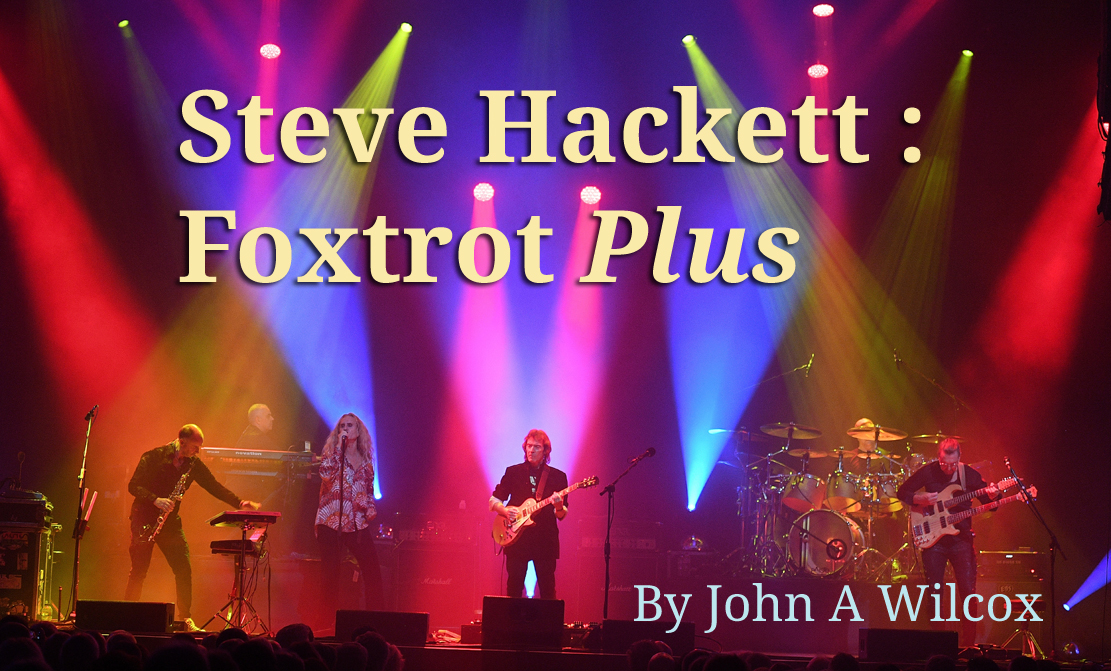
by John A. Wilcox
Steve Hackett is currently on tour supporting his new CD/Blu-Ray set : Foxtrot At Fifty + Hackett Highlights: Live In Brighton. It was a real treat to spend time together to chat on Steve's wife Jo's birthday. Steve told me he'd just done nearly 5 hours of interviews and in his words "I'm in danger of going gaga now. But you'll get honesty from me. That's for sure." No worries - we got on like a house on fire as always. Have a seat and listen in on our conversation...
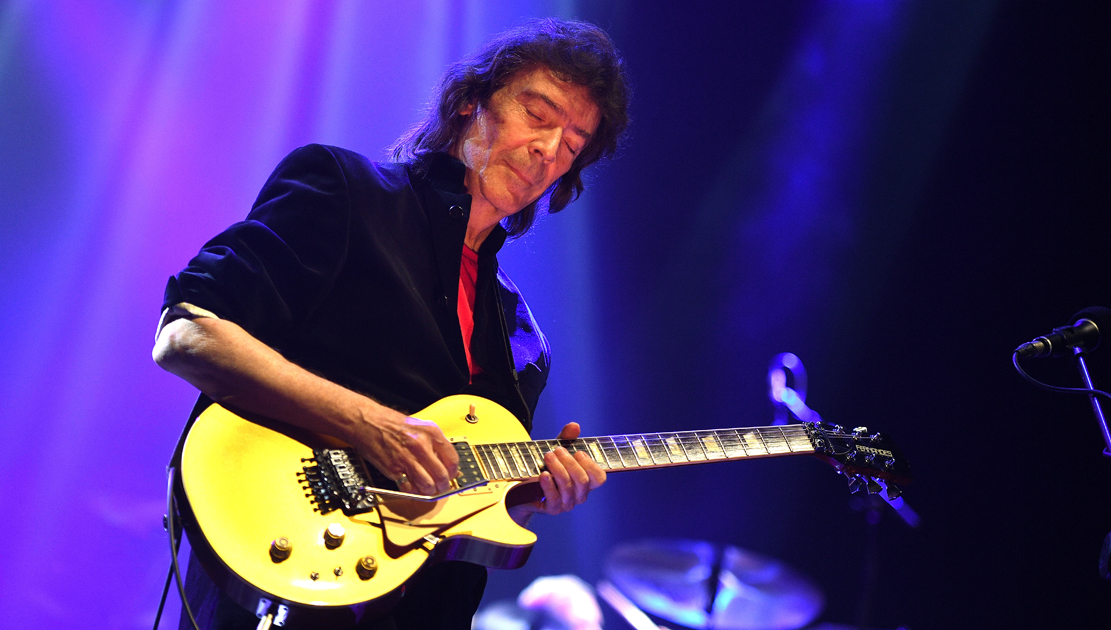
PS: Are you aware of the new & upcoming Atlantic 75th anniversary vinyl remasters of the early Genesis albums? Evidently they are remastered from the original mixes on LPs that play at 45 RPM.
SH: To be honest, it's the first I've heard of it. It doesn't mean that I haven't been informed about it. It's just that my life has been so busy. Working on new material plus the Foxtrot stuff. That one may have escaped the radar. I don't trust my memory anymore. I guess what they're doing is a number of sides then. If it's gonna go at 45 it won't be just the 2 sides; it's gonna be more.
PS: While you're in the midst of the current tour you've already announced the next tour!
SH: I like to push myself to do things. I've just done a new album as well. As well as Foxtrot At Fifty - which is a live album. It's gone to #2 in the rock charts over here in the UK. It seems to be creating quite an interest all over again. Which is heartwarming. My home and my heart are in new material. My body is in older material.
PS: In addition to the upcoming new solo studio album, I understand you've been working on a project with Marillion guitarist Steve Rothery.
SH: That's true. Steve and I have been recording over some time. I'm going to be convening with him soon. Once the tour is over. I've got 2 months in the States first of all. But I'll be phoning him before Christmas. That's gonna be interesting - to talk about how far we've gotten with these tapes et cetera et cetera - that sort of thing. Be interesting to see where he's managed to take it since we convened.
PS: When is the new solo effort due to be released?
SH: I believe that's intended for next February. It's all done. It sounds wonderful. My stepfather thought it was the best he'd ever heard from me. And my mother just wants me to crank it up 'cos she's such a headbanger. That's how they are! So it's gone down very well. I've only played it to 1 or 2 people so far. I think it's different from the usual stuff. It's pretty autobiographical material in a way. Songs that reflect life. From the beginning to the conclusion. A bit of a story. Particularly working in this way of designing things chronologically. An interesting way of working.

PS: So it tells the story of Steve over the course of the album?
SH: I would say it does, yes. I'm very proud. I'm tempted to play it for you right now. But I guess we'll have to wait.
PS: Who's on it with you?
SH: It's the band. Hugo Degenhart plays on one track. Nick D'Virgilio. Craig Blundell. Jonas on bass. I've done some bass myself. Nad on vocals. Me on vocals. Roger. Rob.
PS: Is Amanda Lehmann on there?
SH: Amanda's on it. Extensively.
PS: She's a very good blend with you.
SH: She is a very good blend with me. I think the sound of our two voices together is actually very lovely. She makes my harmonies sound a lot sunnier. She's got some lead vocal work as well, which sounds practically operatic on it. That's really, really good. There's a melody that I dreamt up. I dreamt it while I was recovering from swamp fever. I wrote it down. And all these years later we sing it pretty much as I heard it in the dream. It's healing music. It'll cure you of swamp fever. That's what it did me.
PS: Swamp Fever?
SH: Yeah. I got sick on the Louisiana swamp. It made me ill for a couple of weeks. I was touring at the time. It wasn't until I hit New York when somebody said "You need some penicillin. You need some chicken soup." So I did. But that night when I went to bed I was feeling green and in pain with this swamp fever. I heard this glorious music. As it arrived it was as if the clouds parted. The clouds of pain went and I didn't have any pain anymore. I remembered the music. It was almost a "Blue Fairy" moment. It was magic and quite lovely. It was just a voice that I heard. I sang it to Amanda and I said "Do you think you can do it in this style?" I did say to her "It's semi-operatic." I put a lot of reverb on the voice. It sounds wonderful when you get an operatic voice with a lot of reverb on it. You get the power of it but this sort of ghostliness. Ethereal. It's a lovely moment of her singing. It's very very beautiful.
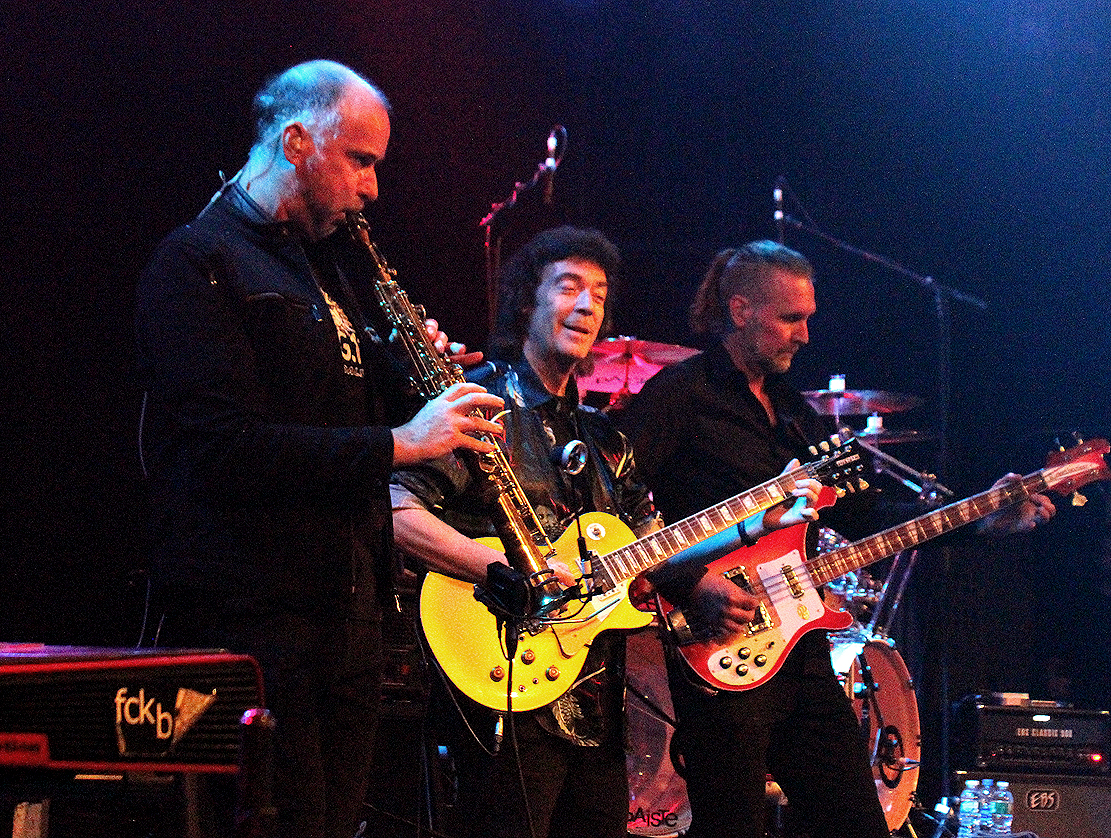
PS: How does your present self see your past self's guitar work on Foxtrot?
SH: I think the guitar parts are good. They are perhaps more sparse than they would be now. If I'm leading my own band aqnd leading the charge I think I would approach with more confidence. But when I look back at what was there I think that what was there was good in terms of parts. The execution would of course be better now. Because I have more control. But the lines that came out back in the day - I think they're very good. There's really just a few lines on Watcher Of The Skies, for instance. Those lines are very good, I think.
PS: They're exactly the right lines!
SH: That's the plan. To do the right thing for the right song at the time. The parts that I came up with for Time Table. That little Cinderella song - the second one on Foxtrot. I was just on one level doubling the left hand on the piano. To color it with guitar so you couldn't tell what you were listening to. Was it guitar or was it piano? The Beatles had certainly done that. It was one of George Martin's little calling cards. A very lovely one at that. Then I did some other stuff. I sort of had George Martin in my mind. Rather, 2 Georges. I was thinking of George Harrison and putting the guitar through a leslie cabinet or two. Play something that was really minimal, but just to do the right thing for the song. Because it wasn't a song that required anything remotely heroic. It's all accompanist work. It requires subtlety. I think the Beatles had great subtlety.
PS: Was there any particular reason Genesis never played Time Table live?
SH: There was the fact that we didn't carry an acoustic piano. Dynamically, it's less progressive. It gets slightly louder at one point then it tends to retire into pure melody at the end. There's a hint of Henry Mancini in there as far as I'm concerned.
PS: Not a bad thing!
SH: Not a bad thing, no, absolutely. With Tony using a plectrum on the inside body of the piano. Picking the strings rather than playing on the keyboard. It's a beautiful sound. We do something like that live. We use a cimbalom dulcimer sound to create that. Cimbalom meets dulcimer. It's so close to the original sound. It's so lovely to hear that. It's very well chosen. It makes the song work. It's lovely. It's got infinite subtlety. It's one of those Cinderella songs that gets to go to the ball. As indeed does Can-Utility And The Coastliners. Only performed a couple of times by Genesis. And Horizons, which I have performed rather more, but not when I was with Genesis. When I play it live these days I use a nylon guitar. The spirit of the nylon serves it best even though it was a steel in the original. It was a Yamaha on the original and it had a really nice sound. Put through a leslie cabinet again. The Genesis curse of putting guitars through leslie cabinets as indeed the Beatles did!
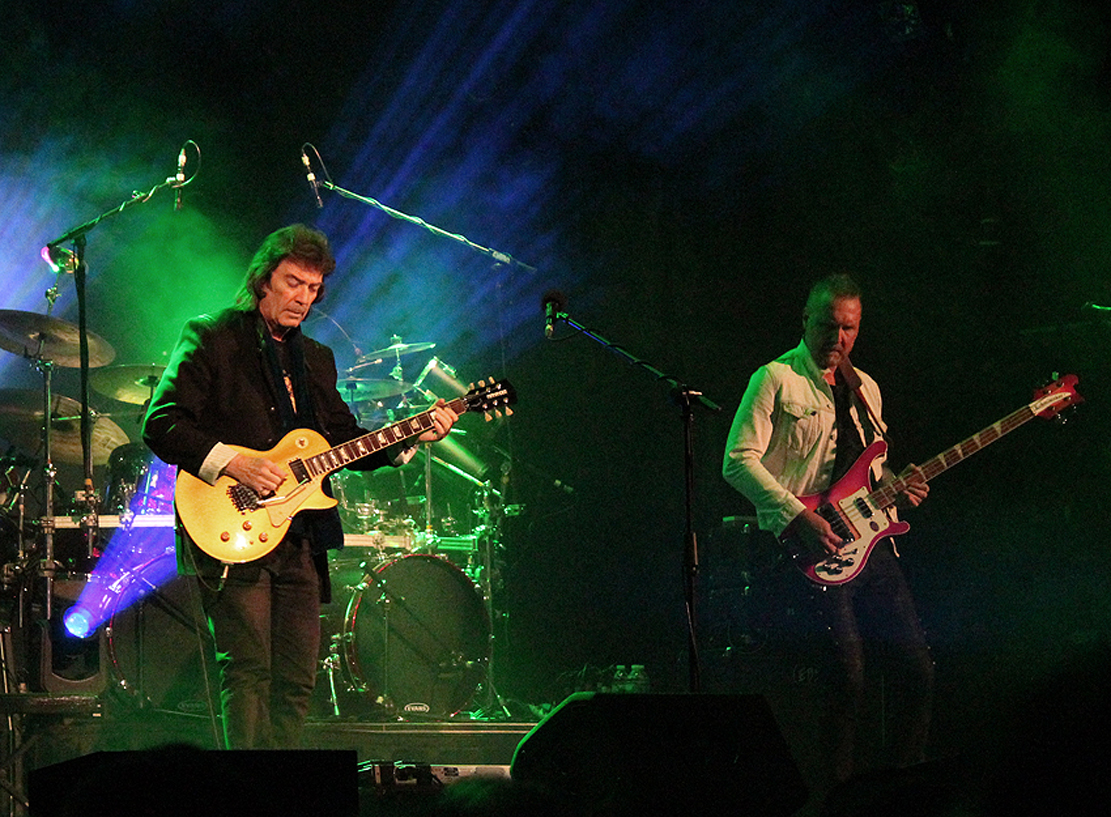
PS: I noticed that after a long absence you've brought Camino Royale back into the set.
SH: One of these days I'm going to do that with orchestra. It would be very difficult for an orchestra to play because the melody is so syncopated. The melody is so robust in terms of the chords that underpin the melody. It's Nick Magnus' melody. I think it's his loveliest tune and it's my favorite melody in rock 'n' roll ever! I just think it's so beautiful. There's something that's driving there. There's something that's syncopated. There's something that's classical. And it's that hybrid between all those things. I must attempt it with an orchestra one day. I'll probably have to correct their timing like crazy because orchestras don't think in that kind of timing. It confuses them.
PS: I imagine that the right conductor could make a difference as well.
SH: Maybe it's that. It's a melody that even when you're playing guitar it's difficult to play it in time. But it has to be possible at some point because I want to hear those chords reeeeallllly big. I don't hear the chords remotely big enough with any of the versions I've recorded so far. But we do something else with it. Taking the spirit of New Orleans, which it's all about. We go off into improvised sax and guitar solos. It basically is jazz rock. That's its nearest concept.
There's interesting versions of that melody on Highly Strung. The last track is a variation on that melody. And it's got bigger chords on it. It starts sounding a bit more orchestral.
PS: I've always felt that Highly Strung was a bit of an overlooked album.
SH: Well, it was. It was at a time when I was struggling with record companies who weren't really interested in what I was doing. I remember taking an advert for it on Billboard and paid for it myself. I thought "The companies simply aren't doing this." All the records had sold out in the British shops. All sorts of stuff. I was putting my money where my mouth was. I think if it had record companies behind it it would have done much better. We did get a hit single off it. Because I worked hard on it myself. I did 8 different mixes of Cell 151 trying to please the record company. That 1980s swimming-against-the-tide aspect. Nonetheless I got a hit single off it. Yet it's not a well known album.
PS: I also have great love for Cured. It's bursting with melodies and ideas.
SH: I'm glad you say that. I'm glad you enjoy it. When I look back I think "Oh, well. Perhaps recording it with a Linn drum at the time was something... - we did it because we could. I'd had a band up to that point and literally I was spending money hand over fist. I was running out of money and the idea of being able to do a very economical album - largely just myself and Nick Magnus. I played bass. He played all the keyboards. Very little from other people. I think my brother played a little bit of flute on it. We took it about as far as we could with the technology that was available to us then. Sampling hadn't quite got into its stride at that point. But very quickly of course. The Fairlight was due to make an appearance. Sampling and the whole samplistic culture was about to take off in a very big way. Cured was a bit of a cross between a seventies and an eighties album.

PS: You've always been a genre-defying artist.
SH: That's a good way to describe it. It's a lovely expression - genre defying. A fan once wrote to me and said that my work was "pan genre" - across genres. I like the word defy. (chuckles) I've committed artistic suicide so many times with things that I've done just because I thought it was worth doing. If I love something. I love the Bay Of Kings album. I was told it would only sell 5000 copies maximum. Of course it ended up being something like 20,000. For an acoustic album, nylon guitar that was unheard of. I was very happy with those sales.
PS: Is there any reason you've not done a Nursery Cryme show with your band?
SH: Well, I've not done every album. I've not done Wind & Wuthering in its entirety. I've done the albums that I've thought hung together in a way... it's like taking the dust off it. Foxtrot and Selling England By The Pound I think are the best of Genesis. I think Seconds Out we chose some of the best. So there's some commonality there.
I would say looking at that album - Nursery Cryme - There are many things on it I think if I were to do it I would probably want to re-record the album in the studio first of all. That's because when I first heard tracks such as Harlequin the vocals sounded amazing. The vocals on record don't sound great. I think it's because 4 guys were around a mic. I don't think that was the best way to get the best out of everybody. The stronger voices should have been to the fore with Pete and Phil. It should have been tracked out. That's what I would do if I did it a revisit. I'm not sure doing it live is the best way to bring the best out of it. But I know that Nad absolutely loves Seven Stones and wants to do it at some point. The mellotron sound was very disappointing on it. It didn't sound the way it did in rehearsal. English Accordion I think is the sound but the tapes all distorted. Wheras when we rehearsed it we had laid some reverb on it and it really sang out. Frankly it had more of a church vibe to it. Rock-meets-church. It needs that. Maybe it needs an orchestra.
Of course the standout track that most people overlook is really The Fountain Of Salmacis. We did go to town I must admit. The mellotron - we recorded it at George Martin's studio AIR London when it was on Oxford Street. We cranked it up with a couple of stacks in a big old room and mic-ed it up at a distance. It really needed some air in more ways than one. The mellotron at least sounded really really good. The keyboard work on it sounds very very beautiful. I'm very proud of that. I told Tony working on that and encouraging him saying "Oh we must use this! We must use this! It sounds great!" Part of my role was to bring out the best in others, I think, in Genesis. Not always successful. There were some great things that didn't always make it onto albums from Genesis. I tried to bring those things back and re-do them. Part of my job is restoration of great ideas.
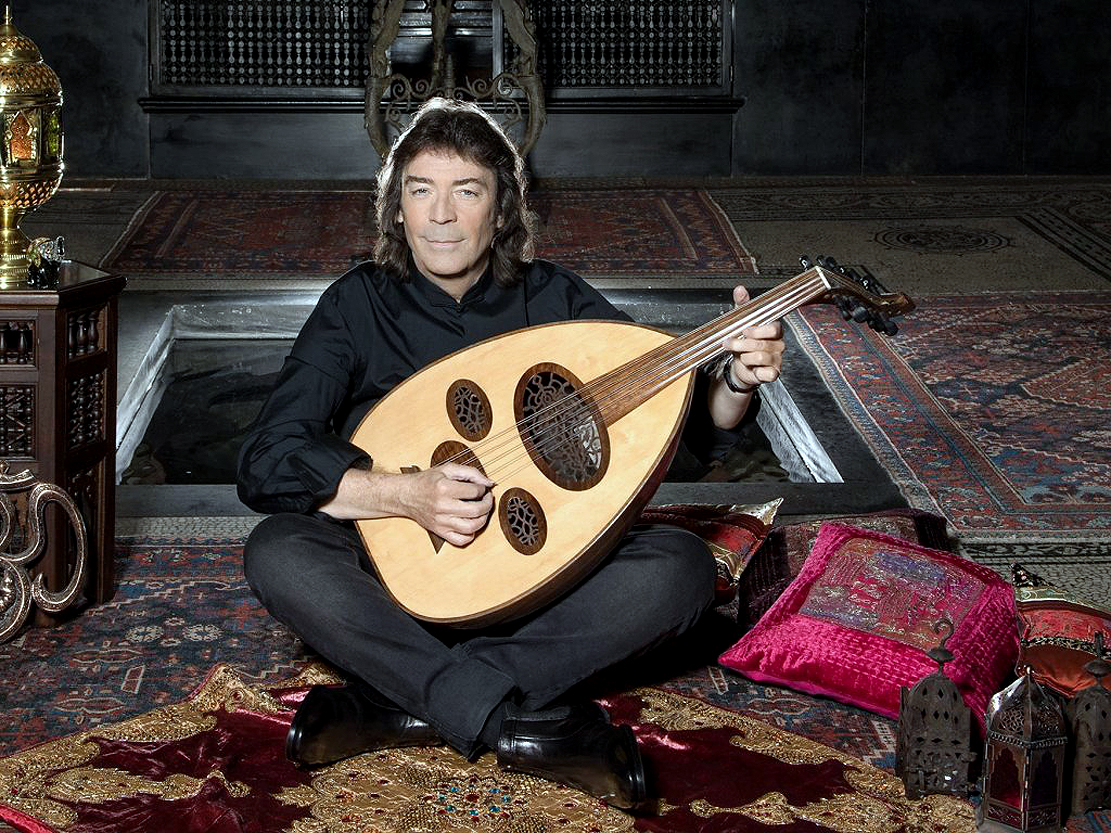
Steve Hackett
Friday, October 13, 8:00 PM
Garde Arts Center
325 State Street
New London, CT 06320
860-444-7373
Garde Arts Center
###
All photos are copyright their respective owners.
Table Of Contents
Contact







